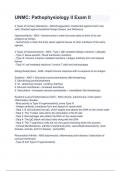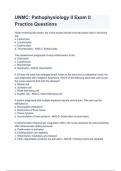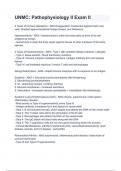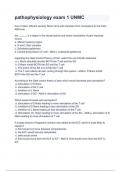Unmc pathophysiology Study guides, Class notes & Summaries
Looking for the best study guides, study notes and summaries about Unmc pathophysiology? On this page you'll find 42 study documents about Unmc pathophysiology.
Page 3 out of 42 results
Sort by
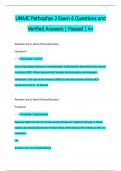
-
UNMC Nursing Pathophysiology 2 Exam 4 Questions and Verified Answers | Passed | A+
- Exam (elaborations) • 74 pages • 2024
- Available in package deal
-
- $13.49
- + learn more
pH ratio : bicarbonate/carbonic acid (base/acid) Three Mechanisms Regulating Acid-Base Balance : 1. Plasma buffer system 2. Respiratory system 3. Renal system Plasma buffer systems : work fast! -HCO3-, H2CO3 -protein buffers -phosphate -cellular ion exchange mechanism 2 How does the respiratory system regulate acid-base balance? : Regulate retention or elimination of CO2 through changes in rate of ventilation. How does the renal system regulate acid-base balance? : kidneys eith...
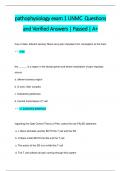
-
pathophysiology exam 1 UNMC Questions and Verified Answers | Passed | A+
- Exam (elaborations) • 39 pages • 2024
- Available in package deal
-
- $13.79
- + learn more
true or false: afferent sensory fibers carry pain impulses from nociceptors to the brain : true the ______ is a region in the dorsal spinal cord where modulation of pain impulses occurs a. afferent sensory region b. S and L fiber complex c. Substantia gelatinosa d. Central transmission (T) cell : c. substantia gelatinosa regarding the Gate Control Theory of Pain, select the one FALSE statement a. L fibers stimulate (excite) BOTH the T cell and the SG b. S fibers inhibit BOTH the...
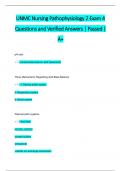
-
UNMC Nursing Pathophysiology 2 Exam 4 Questions and Verified Answers | Passed | A+
- Exam (elaborations) • 26 pages • 2024
- Available in package deal
-
- $14.49
- + learn more
pH ratio : bicarbonate/carbonic acid (base/acid) Three Mechanisms Regulating Acid-Base Balance : 1. Plasma buffer system 2. Respiratory system 3. Renal system Plasma buffer systems : work fast! -HCO3-, H2CO3 -protein buffers -phosphate -cellular ion exchange mechanism 2 How does the respiratory system regulate acid-base balance? : Regulate retention or elimination of CO2 through changes in rate of ventilation. How does the renal system regulate acid-base balance? : kidneys eith...
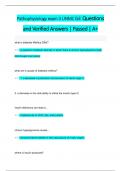
-
Pathophysiology exam 3 UNMC fall Questions and Verified Answers | Passed | A+
- Exam (elaborations) • 22 pages • 2024
- Available in package deal
-
- $12.49
- + learn more
what is diabetes Mellitus (DM)? : a systemic metabolic disorder in which there is chronic hyperglycemia (high blood sugar over years) what are 2 causes of diabetes mellitus? : 1. a decrease in production and secretion of insulin (type 1) 2. a decrease in the cells ability to utilize the insulin (type 2) insulin deficiency can lead to... : impaired use of CHO, fats, and proteins chronic hyperglycemia causes... : structural abnormalities in (the vasculature of) many organs where is insu...
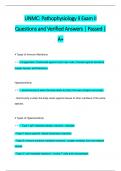
-
UNMC: Pathophysiology II Exam II Questions and Verified Answers | Passed | A+
- Exam (elaborations) • 16 pages • 2024
- Available in package deal
-
- $11.49
- + learn more
4 Types of Immune Alterations : Exaggerated, misdirected against host's own cells, Directed against beneficial foreign tissues, and Deficiency Hypersensitivity : - Autoimmunity is when the body starts to think of its own antigens as foreign. - Isoimmunity is when the body reacts against tissues of other members of the same species. 4 Types of Hypersensitivity : - Type I: IgE mediated allergic reactions / allergies - Type II: tissue-specific / blood transfusion reactions - Type III...
UNMC_ Pathophysiology II Exam II.
UNMC_ Pathophysiology II Exam II Practice Questions.
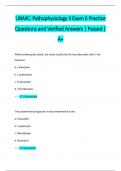
-
UNMC: Pathophysiology II Exam II Practice Questions and Verified Answers | Passed | A+
- Exam (elaborations) • 10 pages • 2024
- Available in package deal
-
- $9.99
- + learn more
While reviewing lab results, the nurse recalls that the most abundant cells in the blood are: a. Leukocytes b. Lymphocytes c. Erythrocytes d. Thrombocytes : C. Erythrocytes The predominant phagocyte of early inflammation is the: a. Eosinophil b. Lymphocyte c. Macrophage d. Neutrophil : D. Neutrophils 2 A 35-year-old male has enlarged lymph nodes in the neck and a mediastinal mass. He was diagnosed with Hodgkin's lymphoma. Which of the following abnormal cells would the nurse...
UNMC_ Pathophysiology II Exam II.
pathophysiology exam 1 UNMC

Do you wonder why so many students wear nice clothes, have money to spare and enjoy tons of free time? Well, they sell on Stuvia! Imagine your study notes being downloaded a dozen times for $15 each. Every. Single. Day. Discover all about earning on Stuvia



